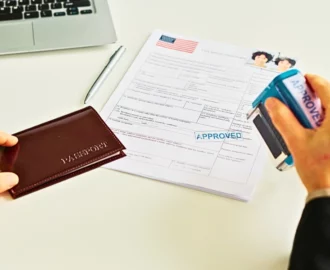
If you want to divorce after getting a 10-year green card, it’s possible to do so in many cases. You may have come to the U.S. to be with your spouse. While your marriage may not have worked out, you may not want to give up the life you have built. Even if you get a divorce with a green card, you may still have immigration options, such as to renew your green card or pursue naturalization.
Can a Divorce Impact Your Green Card?
Whether a divorce affects your green card will depend on the type of green card you have and the details of your marriage. Depending on varying factors, U.S. Citizenship and Immigration Services (USCIS) may question whether your marriage was real, or merely an attempt to help you obtain a green card.
Types of Green Card
There are two main types of green cards that will determine, in part, how a divorce may impact your immigrant status.
These green card types include:
Permanent (10-Year) Green Cards
A 10-year green card is a legal identification document that shows the holder has lawful permanent residency in the U.S. Generally, if you get a divorce while in possession of a 10-year permanent green card, the divorce won’t impact your immigrant status. However, this doesn’t mean it can’t affect your immigration case.
Whether a divorce impacts your permanent green card will largely depend on the timing of the divorce. USCIS might believe your marriage is fraudulent if you divorce shortly after receiving your permanent green card, for example. If USCIS decides to investigate your case and determines that, in fact, your marriage was fraudulent, this could lead to a deportation case.
However, a permanent resident getting divorced isn’t likely to set off any alarms with USCIS after obtaining a permanent green card. Instead, USCIS may discover that your marriage ended in divorce during the naturalization process or when initially applying for citizenship.
Conditional (Two-Year) Green Cards
Individuals who have been married for less than two years at the time of applying for a green card may receive a two-year conditional green card with the help of their spouses. Their spouses must have either lawful permanent resident status or U.S. citizenship.
If you get a divorce before it comes time to apply to remove your green card’s conditions, you may still be able to remain a permanent resident. You’ll need to file the application form, I-751, Petition to Remove Conditions, on your own and disclose the reason for the divorce. You’ll also need to show how you and your spouse had originally intended to get married on legitimate grounds.
Everything from marriage certificates to family photos can help prove that your marriage wasn’t fraudulent.
Proving Your Marriage Was Not Fraudulent
Getting a divorce on its own won’t threaten your green card status. It all comes down to whether you can prove that your marriage was real and that you didn’t simply marry a citizen or permanent resident to enter the country legally.
If USCIS suspects that your marriage ended in divorce because it was fraudulent, you could defend yourself in various ways. For example, your marriage could have led to a divorce because you were the immigrant victim of domestic violence in the relationship. You may also show how your marriage resulted from irreconcilable differences that made you and your spouse incompatible.
Having sufficient evidence showing that your marriage is legitimate may help you to avoid any repercussions as an immigrant during or after a divorce.
Consequences of Divorce After Getting a 10-Year Green Card
You likely won’t see consequences for a divorce if you have a 10-year green card at the time of the divorce. On the other hand, USCIS may become suspicious if you get a divorce shortly after receiving your green card, and you attempt to either renew your green card or seek citizenship through naturalization.
Once you have possessed your green card for five years, you may be able to begin the naturalization process on your path to citizenship. While it’s possible to do this on your own after a divorce, it’s important to remember that people with marriage green cards benefit from shorter waiting periods.
Divorce vs. Legal Separation
Depending on the circumstances of your marriage, you may want to consider getting a legal separation instead of a divorce as you navigate the immigration process. Knowing the differences between a divorce and a legal separation can help you determine which is right for your situation.
The main difference between these two concepts is that it’s far easier to reverse a legal separation than a divorce. A legal separation entails essentially “pausing” the marriage, allowing both spouses to live on their own, independently of one another. While you would still need to go to court to get a formal legal separation agreement, it’s possible to have this decision reversed if you reconcile with your spouse.
Conversely, it’s much harder to reverse a divorce, which is a more permanent form of separation. Getting a divorce officially ends your marriage and will often involve agreements revolving around the division of property and custody of children.
One of the main benefits of getting a legal separation over a divorce is that it can give you and your spouse time to decide whether to proceed with the relationship and work things out or put an end to the relationship.
Renewing a Green Card After Divorce
If you want to renew your green card following a divorce, you can do so generally without worrying whether the divorce will affect your application. You must complete the appropriate form every 10 years to remain a permanent resident, but the application won’t include any questions about your marital status.
Application to Replace Permanent Resident Card
The form you’ll need to complete to renew your green card is Form I-90, Application to Replace Permanent Resident Card. Completing this form will help you maintain your status until you wish to apply for citizenship and undergo naturalization.
When to Get in Touch With an Immigration Lawyer
If you’re worried about a divorce impacting your immigrant status in any way, and you want to avoid potential deportation, it’s important to know when to contact a deportation defense attorney.
If you believe that USCIS suspects your marriage was fraudulent, and you’re under investigation, consider speaking with a deportation defense lawyer to discuss your case and potential defenses.
An experienced Chicago immigration legal services attorney may be able to help you prove that your marriage was legitimate. He or she can collect and present ample evidence, including any joint financial records between you and your spouse, marriage counseling records, and evidence that you shared a home with your spouse, among other pieces of evidence. Your attorney can also help you explain the reason for the divorce and the conditions that led to the end of the marriage.
If deportation proceedings begin, a deportation lawyer can also provide defenses to prevent removal. For example, an attorney may show how you may face persecution in your home country upon your return and that you can remain safer in the U.S. via asylum. You could also remain in the country if you can show that you are the parent of an American citizen, provided you entered the country legally, in most cases. Additionally, a lawyer could show in other ways how your deportation could cause you or your loved ones to face hardships upon your removal.
Taking the Right Steps Before and After a Divorce in Chicago
Sometimes divorces are inevitable and unavoidable, in which cases you can still get a divorce as an immigrant. Couples may drift apart and decide to move on, which often occurs in the U.S. However, you may decide leading up to the marriage to attempt to resolve issues, seeking marital counseling or taking other steps to revitalize your marriage, which could help prevent a divorce.
Generally, you don’t have to worry about a divorce affecting your immigrant status, as long as you can prove that your marriage was legitimate. This is especially the case if you have a 10-year green card. As such, if you plan on getting a divorce as an immigrant, it’s best to prepare as much documentation as you can to help show that your marriage is real as you get ready for the divorce. Having this evidence could help you prove to USCIS the legitimacy of your marriage if they question it at any point when renewing your green card or applying for naturalization.
You may also want to consider getting a legal separation instead of a divorce if this is a more suitable alternative. You may need to consult with an immigration lawyer to discuss your options if you choose to divorce after getting a 10-year green card.




